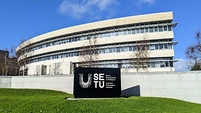O’Callaghan wants fewer than 10,000 asylum seekers per year

By Cillian Sherlock, PA
The Justice Minister has said he wants to see fewer than 10,000 asylum seekers entering Ireland per year.
Jim O’Callaghan said the numbers of asylum seekers entering the country are currently “too high”, after more than 18,500 people applied for asylum in Ireland in 2024.
Before the pandemic there were typically 3,000 to 5,000 applications for international protection in Ireland each year.
It declined to between 1,500-2,600 in 2020 and 2021 before a surge to more than 13,500 in 2022 and 2023.
At the same time, more than 114,000 people arrived in Ireland fleeing the war in Ukraine.
It means a total of 159,000 people arrived in Ireland claiming temporary protection or international protection in the three-year period of 2022-2024
Mr O’Callaghan said these numbers “created a crisis” as he told the Justice Committee on Tuesday: “They threatened to overwhelm the ability of the International Protection Office to process cases and placed the State in a very weak negotiating position, as it needed to dramatically expand the accommodation available to both international protection applicants and Ukrainian citizens.”
His predecessor, Roderic O’Gorman, envisaged a scenario where 15,000 applicants per year would be the “new normal”.
However, Mr O’Callaghan said: “I still think those numbers are too high.”
He said he wanted to reduce the “eye-watering” amounts spent on the International Protection Accommodation Service.
Just over one billion euro was spent on accommodating international protection applicants in 2024 and a budget of 1.2 billion euro has been allocated for this year.
The minister said the main driver of the spending was the number of people arriving into the system who needed to be accommodated.
“And I think what we have seen in the years where there was a surge, 2022-2024, may have been a consequence from what was happening as a result of the Covid years where people didn’t come through.
“But I certainly want to see numbers under 10,000.
“It’s difficult for that to be controlled, but in terms of measures that I introduce, I think that is an effective way of trying to do it.”
He added: “The reason we spent one billion last year is because 33,000 people or so are being accommodated. So that’s the real driver of it.
“And the way to respond to that is to get people through the system much faster, to have their applications processed so they’re not staying in an IPAS centre for one to three years.
“You want to get them in and out promptly over a period of months.”
Mr O’Callaghan said that the department was, on average, paying 84 euro per night to accommodate an applicant last year, but this has reduced to €71.
He said he was reluctant to release that information as he did not want to create an expectation that new contracts would be at the €71 level, as he wanted to bring the rate down further.
Elsewhere, he said he had been subjected to a “doorstep” identification check after coming off a flight.
He said 4,154 such checks of flights had been carried out between January and the end of August.
“They are effective in trying to respond to people arriving here without identification.
“It’s a lot – like it was doorstepped step myself recently coming off a flight.”






